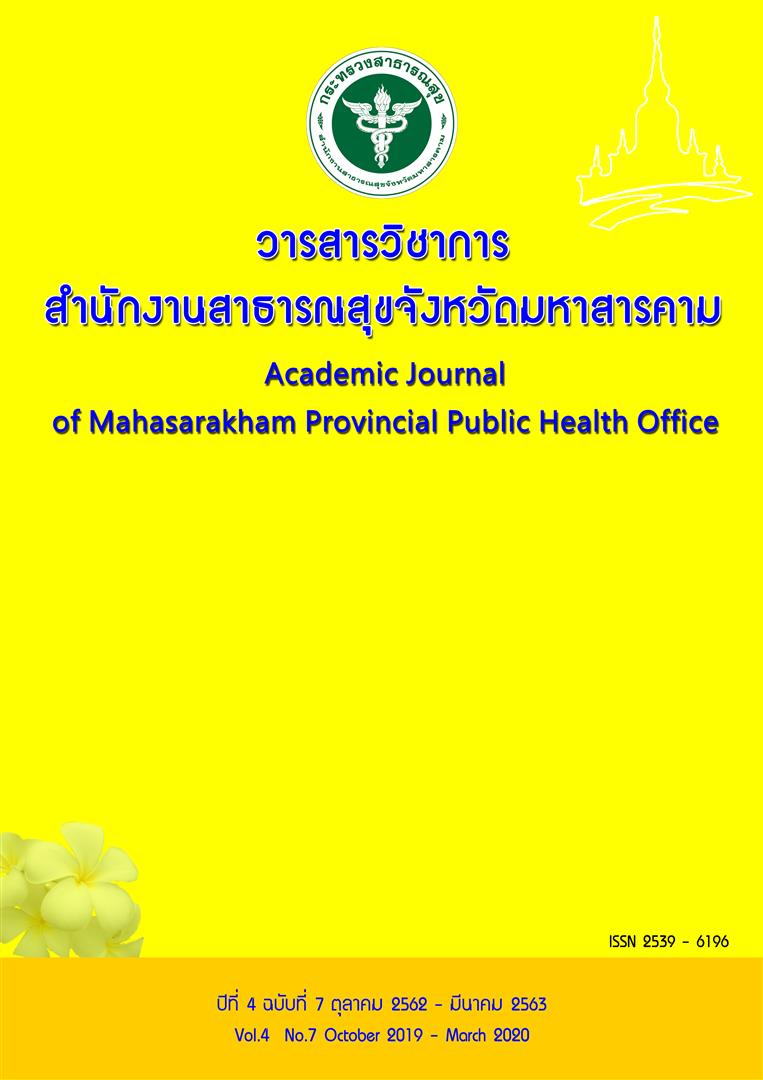การพัฒนารูปแบบการดูแลผู้ป่วยโรคไตเรื้อรังระยะที่ 4 อำเภอนาดูน Development of care model for chronic kidney disease stage 4 in Nadoon District
บทคัดย่อ
Abstract
This research and development aimed to develop the care model for chronic kidney disease stage 4 in Nadoon District, Mahasarakham Province. Four phases in the development of the model were:
1) situational analysis, 2) model development, 3) implementation, and
4) model evaluation. The target group selected by purposive sampling was 150 persons, including multidisciplinary team members, patients with chronic kidney disease stage 4, caregivers, village health volunteers, and village leaders. Research instruments included satisfaction questionnaires, knowledge tests, questions for the focus group, and observation record form. The data were analyzed using frequency, percentage, mean, standard deviation, paired t-test, and content analysis.
The results revealed that 1) the situational analysis phase: the problems of care service were the lack of care coordination system and problem-solving participation. The patients, caregivers, village health volunteers, and village leaders lacked knowledge about chronic kidney disease, misconception in health, denied treatment by renal replacement therapy. The patients had an average of estimated glomerular filtration rate (eGFR) at 22.5 ml/min / 1.73 sq.m. 2) the model development phase: the established model began with the care team building. Consequently, care guidelines were building and enhancing knowledge about the CKD to health care providers, patients with chronic kidney disease stage 4, caregivers, village health volunteers, and village leaders were performed. Those specific groups participated in the workshop meetings along with the essential protocol, including enhancing knowledge, food and exercise training, SKT meditation, and medication-taking. 3) implementation phase: there was implied the proposed model into the CKD clinic and also led to the development of service system in primary care hospitals by using enhancing knowledge, food and exercise training, SKT meditation, and medication- taking for those in the risk groups such as patients with CKD stage 1-3, caregivers, village health volunteers, and village leaders. Besides, the multidisciplinary team members with networks took the visiting for giving advice and encouragement to patients and caregivers; there found the patients and caregivers had participation in managing food, medication taking, exercise training, and SKT meditation. 4) evaluation phase : patients have improved renal filtration rates from an average eGFR 22.59 ml/ min/1.73 sq.m. to 27.50 ml/ min/1.73 sq.m. The satisfaction of multidisciplinary team members was the maximum level ( =4.90, S.D.=0.30),= 4.90, S.D.=0.30), satisfaction of caregivers was maximum level ( =4.93, S.D.=0.24) and the evaluation of chronic kidney disease knowledge of health care providers, caregivers, and village health volunteers/ village leaders after the workshop were significantly higher average than before workshop (p <0.001)
Keywords : Care model, Participation, slowly progressive CKD, Chronic kidney disease stage 4


